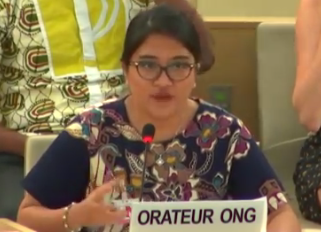
Jun 27, 2019 | Advocacy, Non-legal submissions
The ICJ highlighted the role of women in ensuring respect for human rights in relation to businesses, in a statement to the UN Human Rights Council today.
In an oral statement made during an interactive dialogue with the Working Group on Discrimination Against Women and the Working Group on the issue of human rights and transnational corporations and other business enterprises, the ICJ stated as follows (check against delivery):
The International Commission of Jurists (ICJ) welcomes the report of the Working Group on the issue of human rights and transnational corporations and other business enterprises, and agrees that despite years of progress, women continue to experience multiple forms of discrimination. Women’s voices continue to be unheard and they face insurmountable challenges as they use these voices to access justice on behalf of their communities.
We have seen numerous cases where women lead their communities in protesting abuses committed by business enterprises. Many of these communities are located in remote areas, far from courts or other mechanisms that could be used by them to seek justice. The women who lead these communities often do not identify as women human rights defenders. They see themselves as mothers protecting the health of their families or the land from which they grow their food and earn their living. Because of where these communities are located, local government authorities play a significant role on whether or not these women are heard or are able to access justice.
The women farmers of Kendeng in Indonesia, for instance, have been protesting the operation of a cement factory in their area, which contaminate their water and land. In 2016, the Supreme Court of Indonesia had already ruled in favor of these women farmers and their community, and ordered the revocation of the cement factory’s permit. To this day, however, the cement factory continues to operate, ignoring the final order of the Supreme Court. The Kendeng women farmers have raised the non-implementation of the Supreme Court’s order with the Governor of Central Java and the Indonesian government, but their voices remain unheard.
In the Philippines, the women community leaders of Pio V. Corpus, Masbate, have been protesting plans to establish a cement factory and a coal-fired power plant in their town. They allege that their local government leaders approved plans for this factory and power plant without consultation and in blatant disregard of the disastrous impact these would have on the environment and people’s health.
Mr. President, we join the Working Group in urging States and business enterprises to ensure meaningful participation of potentially affected women in all stages of human rights due diligence. We also urge States to take measures to ensure that women – wherever they may be located – are able to access justice for abuses committed by business. Finally, we recommend that local government authorities be made aware of the Guiding Principles and able to integrate the gender framework and guidance in discharging their human rights responsibilities.
Thank you.
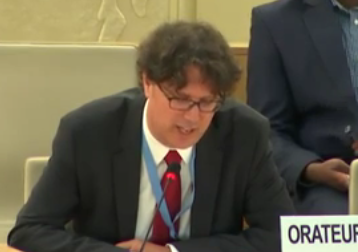
Jun 24, 2019 | Advocacy, Non-legal submissions
At the UN, the ICJ today highlighted the rights and duties of judges and prosecutors to exercise their freedoms of expression, assembly and association to defend the rule of law and human rights.
The oral statement was delivered in a Clustered Interactive Dialogue with the Independent Expert on Sexual Orientation and Gender Identity and the Special Rapporteur on the Independence of Judges and Lawyers, at the UN Human Rights Council in Geneva.
It read as follows:
“The International Commission of Jurists (ICJ) welcomes the report of the Special Rapporteur on the Independence of Judges and Lawyers on freedom of expression, association and peaceful assembly of judges and prosecutors.[1]
As the report acknowledges, exercise of these rights can be subject to restrictions arising from the fundamental need for judges and prosecutors to be perceived as independent and impartial. At the same time, as the report also emphasizes, any such restrictions must be provided by law and be demonstrably necessary to such legitimate aims, which in turn crucially requires proportionality.[2] These standards have been recognized both globally and in all regions of the world.[3] Any such restrictions on judges should be adopted and enforced by the judiciary itself.
We particularly welcome the recognition in the report that in situations where democracy and the rule of law are under threat, judges and prosecutors have not only the right, but potentially a duty, to speak out and organize in defence of democracy, the rule of law, and human rights, and that this can include participating in peaceful public demonstrations.[4]
Far too often in the ICJ’s work around the world, we see Executive and Legislative bodies, as well as compromised judicial hierarchies, arbitrarily or selectively targeting judges and prosecutors for removal, demotion or other disciplinary measures, precisely for exercising these rights to defend against threats to the rule of law. Examples highlighted in our submission to your study included Egypt, Morocco, Honduras, Hungary and Bulgaria.[5]
Mr. Rapporteur, how can judiciaries, governments, and civil society organisations (including international or regional legal professional associations) act internationally to support judges and prosecutors who are facing such abuse in another country?
The ICJ also welcomes the reports of the Independent Expert on protection against violence and discrimination based on sexual orientation and gender identity. We urge all States to strongly support the renewal of this essential mandate at the current session.
Thank you.”
[1] ICJ’s detailed submission to the Special Rapporteur’s consultation is available at: https://www.icj.org/judgesexpression2019/
[2] Paragraphs 39, 45, 46, 89.
[3] In addition to the global and European, Asian, and American standards cited in the report, see the African Commission on Human and Peoples’ Rights, Principles and Guidelines on the Right to a Fair Trial and Legal Assistance in Africa (2005), paras A(4)(s) and (t), and F(d) and (e).
[4] Paragraphs 61, 69, 90, 102.
[5] See for further information: https://www.icj.org/judgesexpression2019/
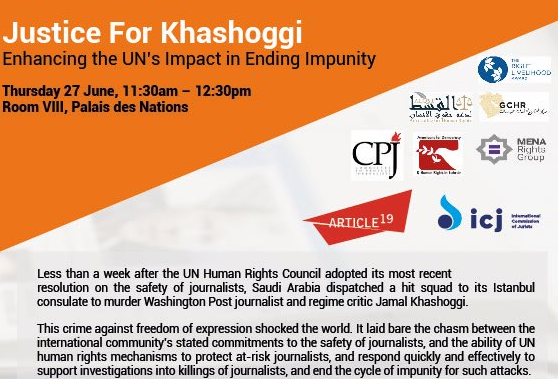
Jun 23, 2019 | Events, News
The ICJ joins other NGOs and UN experts in presenting a side event to the UN Human Rights Council, Thursday 27 June, 11:30am – 12:30pm, in Room VIII, Palais des Nations
Less than a week after the UN Human Rights Council adopted its most recent resolution on the safety of journalists, Saudi Arabia dispatched a hit squad to its Istanbul consulate to murder Washington Post journalist and regime critic Jamal Khashoggi.
This crime against freedom of expression shocked the world. It laid bare the chasm between the international community’s stated commitments to the safety of journalists, and the ability of UN human rights mechanisms to protect at-risk journalists, and respond quickly and effectively to support investigations into killings of journalists, and end the cycle of impunity for such attacks.
This human rights crisis is not limited to autocratic countries or nascent democracies – after several years in decline, the number of killings of journalists worldwide spiked in 2018, whilst impunity for historic cases remains troublingly high, fueling further violence. In Malta, a report by PACE Special Rapporteur Pieter Omtzigt into the killing of Daphne Caruana Galizia more than 18 months ago, highlighted serious concerns over national investigations, pointing to systemic rule of law failings in the country.
As the UN Special Rapporteur on extrajudicial, arbitrary or summary executions, Dr. Agnès Callamard, presents the findings of her independent investigation into the killing of Jamal Khashoggi to the 41st Session of the UN Human Rights Council, join us to discuss what recent attacks on journalists have taught us about gaps in prevention, protection and prosecution, and how to enhance the UN’s response to impunity.
| Panelists |
Dr. Agnès Callamard |
UN Special Rapporteur on extrajudicial, summary or arbitrary executions |
|
David Kaye |
UN Special Rapporteur on freedom of opinion and expression |
|
Hatice Cengiz |
Fiancée of Jamal Khashoggi |
|
Pieter Omtzigt |
Special Rapporteur, Council of Europe |
|
Rob Mahoney |
Deputy Executive Director, Committee to Protect Journalists |
|
Yahya Assiri |
Founder and Director, ALQST |
| Moderator |
Thomas Hughes |
Executive Director, ARTICLE 19 |
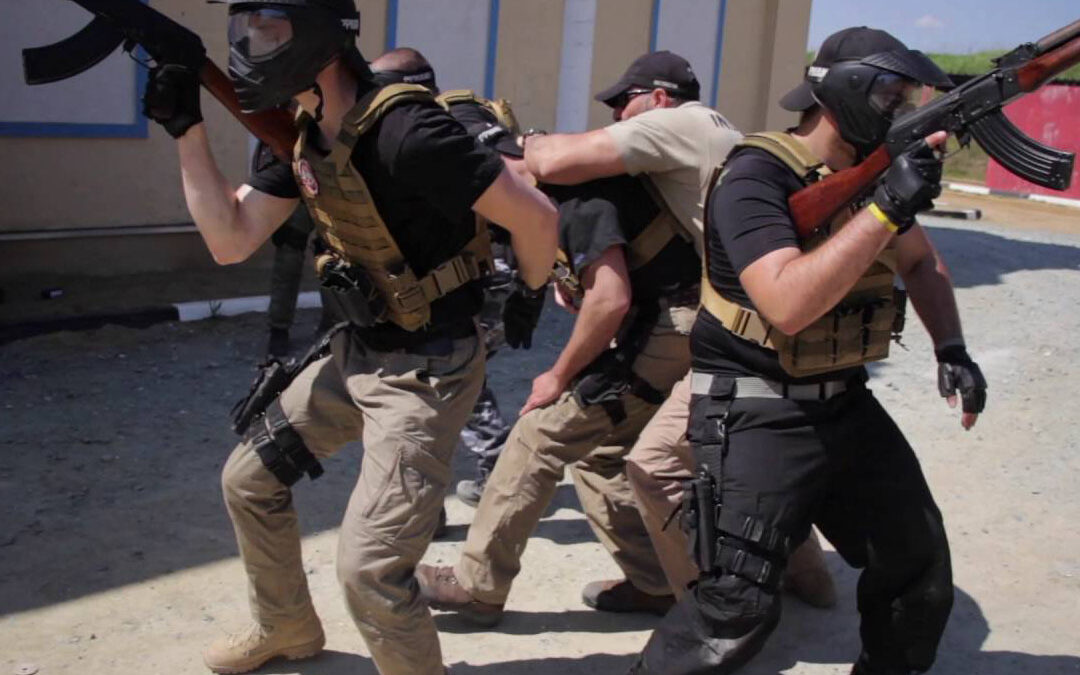
Apr 25, 2019 | Advocacy, Non-legal submissions
The ICJ draws attention to instances of alleged human rights abuses by the private military and security companies in all regions and analyses the challenges related to the accountability frameworks and access to justice.
The ICJ contribution is in response to the call by the UN Working Group on the use of mercenaries, which also has a mandate on private security companies, for written information to assist in its deliberations on “private military and security companies in extractive industries – impact on human rights”.
Private Military and Security Companies (PMSCs) are hired by companies engaged in extractive operations in all geographic regions of the world, but their activities or operations that give rise to allegations of human rights violations and abuses seem to be prevalent regions where abundance of natural resources and the favorable environment for foreign investment are propitious to the establishment of extractive companies in, many times, fragile contexts.
In this regard ICJ suggests the Working group to consider the following recommendations:
- States should ensure that their domestic legal framework provides for real access to effective remedies for victims of human rights abuse by PMSCs and extractive companies.
- Provide guidance to States to establish effective legal accountability frameworks of criminal or civil nature that pay due consideration to the inherently dangerous nature of the mining activity and the security services operating in that context.
- Recommend that States establish legal frameworks that require meaningful reporting/disclosure of company policies and practices in relation to human rights, including their use and effectiveness of grievance mechanisms at the operational level.
- Both extractive and security companies should respect all human rights in accordance with international standards, including the UN Guiding Principles on Business and Human Rights, the Voluntary Principles on Security and Human Rights and other sectorial guidance applicable to PMSCs.
- Security companies, whatever their structure or ownership, should carry out enhanced processes of due diligence consistent with international best practices, and participate in remediation schemes.
Universal-ICJ Submission PSC and extractive industries-Advocacy-non legal submissions-2019-ENG (full text of the report, in PDF)
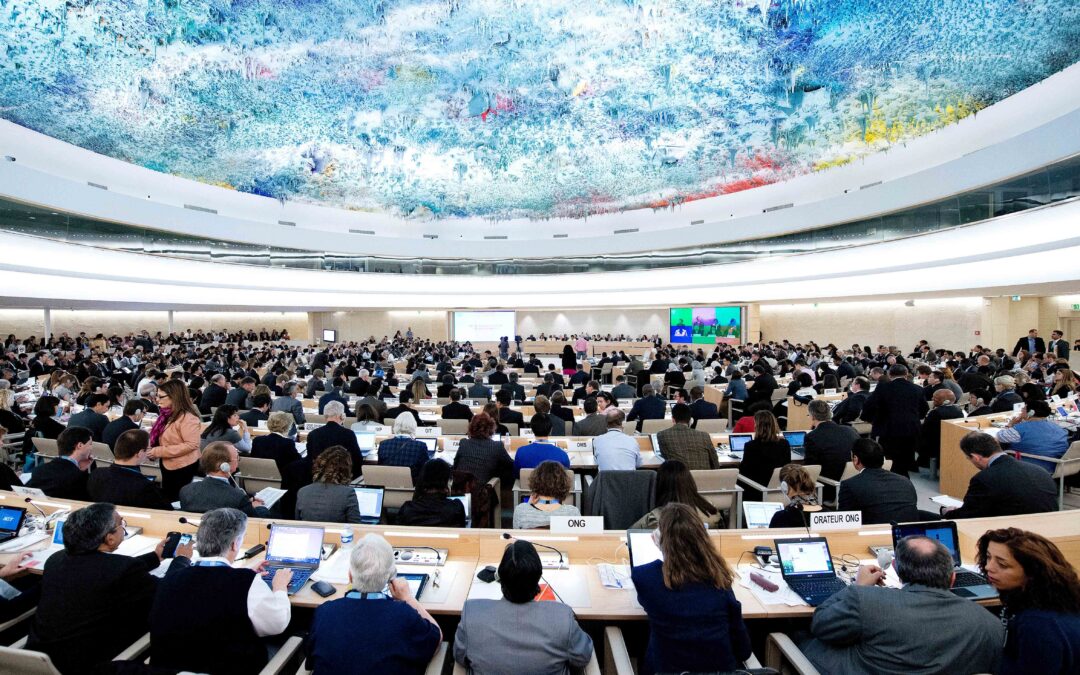
Mar 22, 2019 | News
The ICJ today strongly welcomed the renewal of the key UN expert on counter-terrorism and human rights, on terms that maintain the mandate’s independence, integrity and its essential focus on human rights.
The renewal of the mandate of the Special Rapporteur on the promotion and protection of human rights and fundamental freedoms while countering terrorism, was enacted by a resolution adopted by consensus at the UN Human Rights Council in Geneva.
To acheive this successful outcome, Mexico (which leads the resolution) and other States had to defend the text of the resolution against attempts by Egypt and other States to insert language aimed at diluting, distorting or distracting the mandate from its current focus on preventing and responding to violations of human rights and on securing respect, protection and fulfilment of the human rights of victims of terrorism.
The Special Rapporteur delivers thematic reports to the Human Rights Council, carries out visits to countries, and acts on individual complaints. In the overall counter-terrorism architecture of the UN, the Special Rapporteur is also the only person with an exclusive independent mandate to remind States of their human rights obligations while countering terrorism, to advise them how to do so, and to draw public attention when they do not. So any dilution of the mandate would have also put the integrity and efficacy of the overall UN counter-terrorism strategy and architecture at risk.
Following the adoption of the mandate renewal resolution by the Council, the ICJ and other organisations expressed its deep appreciation for Mexico’s efforts, together with the strong support of numerous other States, to secure the future of the mandate.
The resolution text is available here: https://undocs.org/A/HRC/RES/40/16
Additional background is here.









